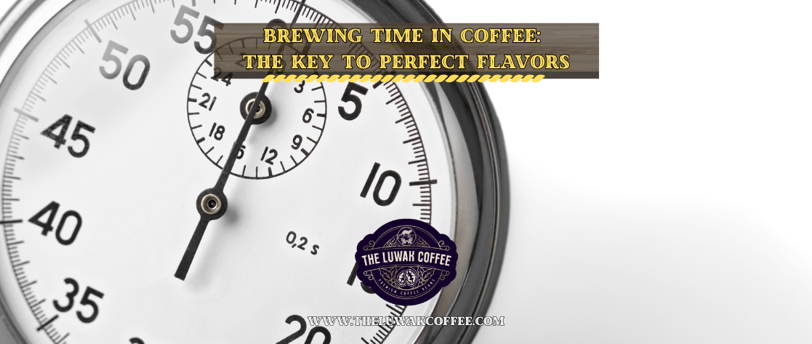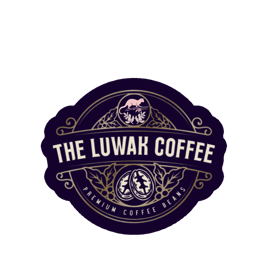CERTIFIED WILD LUWAK COFFEE, 100% WILD
Brewing Time in Coffee: The Key to Perfect Flavors
COFFEE BREWING PARAMETERS
2/17/20257 min read


Introduction to Brewing Time
Brewing time refers to the duration during which water interacts with coffee grounds, facilitating the extraction of flavors and aromas. In the context of coffee preparation, this period is critical as it directly impacts the overall taste and quality of the brewed coffee. A precise brewing time ensures that essential compounds are adequately extracted, allowing the drinker to enjoy a full spectrum of flavors, from the rich and robust to the subtle and delicate notes that characterize various coffee beans.
During the brewing process, water acts as a solvent, dissolving the soluble compounds found within the coffee grounds. The balance of extraction is paramount; if brewing time is too short, the resulting coffee may be under-extracted, leading to a weak and sour taste. Conversely, an overly long brewing time can result in over-extraction, causing bitterness and unpleasant flavors. Therefore, manipulating the brewing time can significantly affect the coffee's complexity and richness.
The Science Behind Brewing Time
Brewing coffee is a complex process influenced by various factors, including water temperature, grind size, and notably, brewing time. Understanding the chemistry behind coffee extraction is crucial for achieving the optimal flavor profile. As hot water interacts with ground coffee, it begins to solubilize different compounds present in the beans, releasing them into the brew. The nature and sequence of these extracted compounds significantly affect the taste and aroma of the final beverage.
During brewing, coffee compounds can be categorized into three main groups: acids, sugars, and oils. Each group contributes different flavor notes to the coffee. For instance, acidic compounds generally offer brightness and vibrancy, while sugars provide sweetness, and oils contribute body and mouthfeel. The duration of the brewing process is pivotal in determining how much of these compounds are extracted. Insufficient brewing time may lead to under-extraction, where not enough solubles are dissolved, resulting in a sour or acidic taste. Conversely, excessive brewing can cause over-extraction, which typically yields a bitter and astringent flavor profile.
Finding the perfect balance in brewing time allows coffee enthusiasts to harness the desired flavors while minimizing undesirable ones. Ideal extraction times vary depending on the brewing method; for example, a French press might require 4 to 5 minutes, while an espresso shot should typically be brewed within 25 to 30 seconds. By paying close attention to brewing time, one can significantly influence the overall quality of the coffee, ultimately leading to a more enjoyable experience.
Ideal Brewing Times for Different Coffee Styles
Brewing coffee is both an art and a science, and understanding the ideal brewing times for various coffee styles can significantly enhance the flavor profile of your cup. Each brewing method requires a specific amount of time to extract the perfect balance of flavors from the coffee grounds.
Starting with drip coffee, which is one of the most common methods, the recommended brewing time ranges between 4 to 6 minutes. This duration allows water to fully permeate the coffee grounds, extracting essential oils and flavors while avoiding over-extraction. If brewed too long, drip coffee can become bitter, detracting from its smooth taste.
Espresso, on the other hand, is brewed much quicker, typically in about 25 to 30 seconds. This method uses a fine grind of coffee and high pressure to extract concentrated flavors in a short time frame. The brevity of the brewing process means that you must use high-quality beans to achieve a well-balanced espresso shot, as even a slight over-extraction can lead to undesirable bitterness.
For the French press, a longer immersion time is recommended, generally around 4 minutes. This method allows the coffee grounds to steep directly in hot water, extracting robust flavors and a full body. It is crucial to avoid extending the steeping time beyond this point, as it can lead to excessive sediment and an overly strong taste.
Lastly, the pour-over technique suggests a brewing time of approximately 3 to 4 minutes. This method involves pouring water in a controlled manner over coffee grounds, allowing for a more precise and nuanced extraction. By adjusting the pour speed and ensuring an even saturation of the grounds, one can achieve a delightful flavor balance.
Understanding these ideal brewing times is essential for coffee enthusiasts seeking to perfect their craft and enjoy the rich, diverse flavors that different coffee styles can offer.
Factors Affecting Brewing Time
Brewing time in coffee is not merely a matter of preference; it is significantly influenced by several critical factors. Each aspect contributes to the extraction process, which ultimately impacts the flavor profile of the coffee. Understanding these factors allows enthusiasts to tailor their brewing methods to achieve optimal taste and aroma.
First and foremost, grind size plays a crucial role in determining brewing time. Finer grinds increase the surface area exposed to water, which can lead to quicker extraction but may also result in over-extraction if left too long. Conversely, coarser grinds slow down the extraction process, requiring a longer brewing time to achieve the desired flavor. It is essential to match the grind size with the brewing method employed; for example, espresso requires a fine grind, while French press typically benefits from a coarser option.
Water temperature is another vital factor affecting brewing time. The ideal water temperature for most brewing methods ranges between 195°F to 205°F. Water that is too hot can extract undesirable bitter compounds, while water that is too cool may lead to under-extraction, resulting in a sour taste. Proper temperature control is necessary to ensure balanced extraction within the brewing time frame.
The coffee-to-water ratio also influences brewing time. A higher coffee-to-water ratio generally necessitates a longer brewing phase to properly extract flavors. Conversely, a lower ratio may require a shorter time, reducing the risk of over-extraction. Finding the right balance between these components is crucial for achieving a harmonious cup.
Finally, the brewing method itself dictates how these variables interact. Different techniques, such as pour-over, immersion, or espresso brewing, each have their recommended times and specific requirements. By being mindful of these factors—grind size, water temperature, coffee-to-water ratio, and brewing method—coffee enthusiasts can refine their processes, enhancing both the brewing time and the resulting flavor. Attention to detail in these areas is essential for crafting the perfect cup of coffee.
Experimenting with Brewing Time: Finding Your Perfect Cup
Brewing coffee is an intricate process that balances both science and artistry, making personal experimentation essential for discovering your ideal cup. One of the most influential factors in brewing is the time the coffee grounds are in contact with water. By varying this brewing time, you can significantly alter the flavor profile of your coffee, paving the way to a customized experience tailored to your preferences.
Start your journey by selecting a specific type of coffee bean and grind size. Different beans have unique flavor profiles and characteristics that respond to varying brewing times. For example, a coarser grind may require a longer brewing time, while a finer grind could yield an optimal cup in a shorter duration. Once you have your parameters set, consider conducting a series of taste tests.
Begin with a baseline brewing time—commonly, this is around four to five minutes for methods like drip coffee or French press. Brew a cup, then take notes on both the flavors you experience and the overall enjoyment of the coffee. After your initial taste test, incrementally adjust the brewing time, either reducing it in one-minute intervals or increasing it, and repeat the tasting process. Use a consistent method of preparation, as variances in temperature, water quality, and equipment can lead to inconsistent results.
As you proceed with your experiments, document your findings meticulously. Create a simple table to log each brewing time along with corresponding flavor notes. Not only will this help you identify patterns in your preferences, but it will also give insight into your personal flavor profile over time. Ultimately, achieving the perfect cup of coffee is an evolving journey, encouraging both creativity and scientific inquiry paired with your unique taste buds.
Common Mistakes with Brewing Time
Brewing time plays a crucial role in determining the flavor profile of a cup of coffee. However, many coffee enthusiasts unknowingly fall into traps that can compromise the quality of their brew. One of the most prominent mistakes is brewing coffee for too long. When coffee sits in contact with water beyond the optimal brewing time, it can lead to over-extraction. This process extracts undesirable compounds, resulting in a bitter and astringent flavor. To avoid this, it is essential to adhere to recommended brewing times specific to the coffee brewing method being employed. For instance, a French press typically benefits from a four to five-minute steep, while espresso requires only 25 to 30 seconds.
Conversely, brewing for too short a duration can result in under-extraction. This leads to a weak, sour, and lacking flavor that fails to showcase the coffee’s true potential. In this case, many brewers skew towards shorter brewing times in an attempt to prevent bitterness. To strike the right balance, it is vital for coffee drinkers to familiarize themselves with the appropriate brewing times for their chosen methods, which can vary widely. For example, drip coffee makers often require between four to six minutes for optimal extraction, while pour-over techniques generally need two to three minutes.
Another common pitfall involves not using a timer, which can lead to inconsistencies in brewing time. Relying solely on intuition can result in varying brew strengths and flavors in each cup. Therefore, utilizing a timer can greatly enhance the reliability of brewing coffee. Additionally, measuring coffee grounds accurately and calibrating the water temperature are also critical elements that contribute to successful extraction. By being mindful of these common mistakes and taking the necessary precautions, coffee drinkers can ensure a consistently pleasurable coffee experience, highlighting the distinct flavors of their chosen beans.
Conclusion: Mastering Brewing Time
In the pursuit of an exceptional cup of coffee, understanding brewing time emerges as a crucial element that cannot be overlooked. The duration of extraction significantly influences the flavors and aromas found within each brew. By meticulously adjusting brewing time, coffee enthusiasts can unlock a myriad of flavor profiles, leading to a more personalized and enjoyable experience. Throughout this discussion, we have elucidated how different brewing methods—be it espresso, French press, or pour-over—each possess unique optimal brewing times that cater to their specific characteristics.
The balance between under-extraction and over-extraction is delicate. Under-extraction can result in a sour or weak cup, while over-extraction may lead to a bitter and harsh taste. Thus, mastering brewing time is essential for achieving that perfect harmony of flavors, as it allows one to extract the desirable notes from the coffee while leaving behind the unpleasant ones. As various factors such as grind size, water temperature, and coffee-to-water ratio come into play, an awareness of brewing time becomes even more paramount in the coffee-making process.
Encouraging readers to embrace experimentation is crucial. Each individual’s palate is unique, and what may be ideal for one person might not resonate with another. Therefore, applying the insights gained from this blog post will allow coffee lovers to refine their brewing techniques, discover new flavor profiles, and ultimately enjoy a richer coffee experience. By continually exploring the intricate relationship between brewing time and flavor extraction, one can elevate not only their coffee enjoyment but also their overall appreciation for this cherished beverage.
